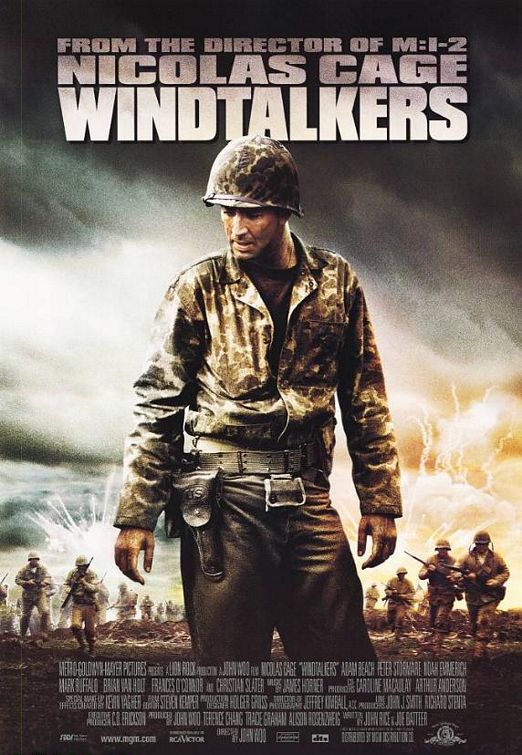"Putting on the Armor of God"

| None | Light | Moderate | Heavy | |
|---|---|---|---|---|
| Language | ||||
| Violence | ||||
| Sex | ||||
| Nudity |
What You Need To Know:
Ultimately, the decisions these soldiers face are resolved in a way that stresses sacrifice, heroism and saving lives in a just cause. At crucial moments, the filmmakers make positive references to Christianity. Thus, WINDTALKERS seems to have a solid Christian worldview. This worldview, however, is diluted by very strong violence, foul language and some pagan, politically correct elements invoking the Romantic notion of the noble savage, an idea that contradicts the Bible’s view of original sin
Content:
(CC, BB, Pa, PC, Ro, RH, P, LLL, VVV, N, A, M) Christian worldview stressing sacrifice, family, heroism, and discovering moral truth with one protagonist recovering some of the Christian faith he learned as a boy in a Roman Catholic church and school, mitigated by syncretistic, Navajo, pagan religious elements and mild, multicultural, politically correct elements in a Romantic worldview context; some revisionist history; some patriotic elements; excessive foul language with at least 64 obscenities and 13 profanities including some “f” words and misuse of Christ’s name; very strong World War II violence in Pacific island battles including many gun battles, knife fights, bayonet fights, flame throwers, bombs, explosions, decapitation, limbs torn off, people on fire, on-fire, drowning, screaming soldiers, artillery, face-to-face shootings in foxholes, etc.; no sexual immorality; two or three very brief, obscured flashes of playing cards with naked women on them; alcohol use and drunkenness; smoking; and, gambling, lying, cheating, and racism rebuked.
More Detail:
Since SAVING PRIVATE RYAN burst upon the cultural landscape a couple years ago, Hollywood has latched onto the idea of revisiting World War II and the American war movie. The latest entry in this trend is John Woo’s WINDTALKERS.
History reveals that, during WWII, the United States turned to the Navajo Indians in Monument Valley, Arizona, and their unusual language to help secure secret communication in the Pacific Theatre of Operations. Those who could speak the Navajo tongue, nicknamed “windtalkers,” were so valued that they had Marine guards assigned to “protect the code at all costs,” meaning that, in the event of capture, the guards must kill their assignments.
In this movie, crusty Sergeant Joe Enders, played by Nicolas Cage, is assigned to “protect” Private Ben Yahzee, played by Adam Beach, a handsome, charming Native American code talker. After trying to recover from a traumatic tour where he lost all his men, Enders gets a nurse to help him cheat his way through a hearing test and get sent back out to the battlefront on some islands near Japan. The U.S. wants to take the islands so they can more easily bomb Tokyo.
Enders and another Marine, Ox Henderson (Christian Slater), meet up with their assigned Navajo, Yahzee and Charlie Whitehorse (Roger Willie) at Camp Pendleton, Calif., where all are trained for their upcoming battlefront tour. Since he may have to kill Ben, Joe remains arms-length with Private Yahzee, but Henderson (who wears a cross) is very friendly, inclusive and interested in the Native Americans. One very backward, redneck marine, Chick Rogers, brilliantly played by Noah Emmerich, is extremely prejudiced toward the Navajo. He calls Yahzee “Chief,” to which Yahzee replies, “How did you know I was a chief? You must have seen me showering with my war bonnet on!” The others howl with laughter, infuriating Chick and giving him fuel for a future attack on the “slanty-eyed savage.”
As the fighting on the island commences, it is clear that Joe is becoming more and more bent upon rage and revenge against the Japanese from his previous failed command. Ben is a timid, but progressing warrior, and an excellent radioman/windtalker. He successfully radios past Japanese intervention attempts and gets the guns on the U.S. ships to hit the Japanese targets with amazing precision. The U.S. continues to take one enemy bunker after another because of his efforts.
During another precarious battle, Joe and Ben team up to fool the Japanese and steal the only working radio in the area. Ben pretends he is Japanese and leads Enders at gunpoint to the enemy bunker.
Eventually, Joe begins to identify with Ben, and even Chick repents from his racist attitudes. Joe in fact rediscovers some of the humanity he left behind himself. He gives a wounded little boy on Saipan a bottle of painkilling medicine and discovers that both he and Ben went to a Roman Catholic school, where they were both confirmed as children of our Lord and Savior, Jesus Christ. After a dreadful skirmish, however, it appears that the Japanese may capture one or both of the “windtalkers.” Joe, Ben, Ox, and Charlie are faced with terrible decisions.
WINDTALKERS is a beautifully filmed movie, masterfully directed by John Woo. Woo has a talent for taking viewers right into the action and getting them involved in the fate of his characters. The script by John Rice and Joe Batteer is well written and thought provoking, although a relationship between Nicolas Cage’s character and a nurse who befriends him is unresolved. Cage effectively portrays the trauma that provokes his character’s self-destructive rage and isolation. A couple of these scenes were, in fact, quite poignant. Adam Beach is also good as Ben Yahzee, the inexperienced but talented and charming Navajo recruit, as was the rest of the cast.
The movie raises the age-old question concerning the extent of thought the average soldier should use when it comes to ethical considerations. Joe and Ox are faced with the decision of whether to follow orders and kill the Navajo code talkers, or let them be captured and tortured by the Japanese, thereby endangering the code as well as the war effort, not to mention the lives of countless American soldiers. When they discover the orders that their superiors have given Joe and Ox, Ben and his friend Charlie must decide what they should do about it, especially if they are faced with certain capture by the enemy.
Ultimately, the decisions these soldiers face are resolved in a way that stresses sacrifice, heroism and saving lives in a just cause. At a crucial moment, Joe recites a prayer he learned as a Christian child. Thus, WINDTALKERS seems to have a solid Christian worldview. This is not surprising since the director, John Woo, is reportedly a Christian.
Regrettably, WINDTALKERS’ Christian worldview is diluted by very strong, bloody wartime violence and plenty of foul language, including some strong profanities. Also, the movie could have used a stronger focus on God, not to mention Jesus Christ. For example, the addition of a couple scenes with an army chaplain would have helped immensely. Finally, WINDTALKERS contains some Romantic elements. For instance, all of the Navajo code talkers seem to be brave, charming, educated, reasonable, patriotic, and tolerant men, but many, if not most, of the white soldiers are troubled, pitifully ignorant or heartless. Thus, the movie suggests that the Romantic notion of the “noble savage” is true. In addition, WINDTALKERS shows Charlie and/or Ben doing Navajo ceremonial chants. One of the chants apparently seems to be a prayer of protection for some dead soldiers against evil spirits or demons. Although this particular practice fits in well within a Christian context, MOVIEGUIDE®’s research shows that the Navajo worldview, although it acknowledges a Creator, may be infected by pagan ideas about what some Navajos call Mother Earth and Father Sky. Thus, at times Charlie and Ben seem to be chanting to the earth, the sky and the sun rather than to God. The filmmakers, however, have decided not to translate the chants. Therefore, in the final analysis, it seems that Joe’s Christian prayer and the other references to Christianity and the Roman Catholic church take precedence over any possible paganism that the movie may contain.
Hence, Joe’s recovery of part of his Christian heritage remains the deciding factor in the ending of this story and in any description of the worldview in WINDTALKERS. In the Bible, the title God is referred to the most often is “Lord of Hosts,” or “Captain of the Hosts.” We are given our armor and battle instructions in Chapter Six of Paul’s letter to the Ephesians, and we’re warned that our adversary prowls about, seeking whomsoever he may devour. We must be battle-minded as Christians, and we must focus on becoming fit and trained by arming ourselves with truth, righteousness, faith, salvation, readiness, and the Word of God. With this mindset, we will be able to determine when we can follow the orders of men, and when we must obey the commands of God.



 - Content:
- Content: 




